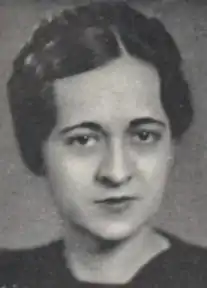Waurine Walker | |
|---|---|
 Waurine Walker, as a teacher at Waco High School in 1938 | |
| Born | Waurine Elizabeth Walker June 30, 1908 Tyler, Texas |
| Died | July 22, 1987 (aged 79) Austin, Texas |
| Occupation | Educator |
| Known for | President of the National Education Association |
Waurine Elizabeth (or Isabel) Walker (June 30, 1908 – July 22, 1987) was an American educator based in Texas. She was elected president of the National Education Association in 1954.
Early life
Waurine Isabel Walker was born in Tyler, Texas,[1][2] the daughter of Alonzo "Lon" Singleton Walker and Minnie Lee Rogers Walker.[3] Her father was a railroad conductor. She trained as a teacher at Baylor University.[4] She earned a master's degree from Teachers College, Columbia University.[5] She earned a doctorate in education at Baylor University.[1] In 1955 she was presented with an honorary Doctor of Laws degree at Lindenwood College.[6]
Career
Walker taught school in Mineral Wells and Waco. She was director of teacher relations and certification for the Texas Education Agency.[5][7] In 1950, she received the Texas State Achievement Award, from the Texas chapter of Delta Kappa Gamma.[8] She was president of the Waco Classroom Teachers Association,[9] and the Texas State Teachers Association.[10][11]
Walker was elected president of the National Education Association in 1954.[12][13] As NEA president, she lobbied for federal school building funds,[14] and appeared on television to discuss education issues.[15] She tied many of her policy positions to the arrival of the baby boomers in American public schools, requiring more space and more teachers.[16] She gave keynote addresses at the World Federation of Teaching Professions meeting in Norway in 1954,[17] and in Turkey in 1955.[18] In 1955, she spoke at Baylor University's commencement,[5] saying "Neither free speech, nor a free press, nor popular government nor universal education can long endure without a constantly renewed supply of teachers. Upon the character and quality of teachers the effectiveness of all education depends.”[4] As former president in 1957, she addressed the NEA again, in the aftermath of Brown v. Board of Education ruling on school desegregation: "Fear to speak out on controversial issues seems to be growing," she said, before exhorting teachers to give students encouragement "to raise questions about economic, social and political issues in today's world."[19]
In the early 1960s, Walker was president of the Texas Retired Teachers Association, and worked for the founding of the Texas Retired Teachers Residence in Waco.[20] She was part of a US Department of Defense project to study the education of American military dependents overseas, and toured armed forces schools in Western Europe and East Asia. "We found the Japanese-based American school outstanding as compared to European bases," she remarked, noting further than that the European schools excelled in language instruction.[1]
Personal life
Walker died in 1987, in Austin, Texas.[2]
References
- 1 2 3 Matlock, Cora B. (1963-08-18). "Educator Takes Look at Drop-Out Picture". The Austin American. p. 17. Retrieved 2022-03-18 – via Newspapers.com.
- 1 2 "Waurine Elizabeth Walker". Austin American-Statesman. 1987-07-24. p. 25. Retrieved 2022-03-18 – via Newspapers.com.
- ↑ Waurine Walker's birth certificate gives her middle name as Isabel, Texas Birth Certificates via Fold3; her obituary gives her middle name as Elizabeth. The names are cognates and they are clearly the same individual.
- 1 2 "Impact: Firmly Rooted: 1940s–1970s". Baylor University. 2019-11-22. Retrieved 2022-03-18.
- 1 2 3 "Baylor University Press Release". Baylor University Digital Collections. March 23, 1955. Retrieved 2022-03-18.
- ↑ Lindenwood University, Commencement program (June 1955): 8.
- ↑ "Ex-Teacher will Speak to Students". Fort Worth Star-Telegram. 1963-02-24. p. 36. Retrieved 2022-03-18 – via Newspapers.com.
- ↑ "Texas State Achievement Award Recipients 1948 to 2019" Delta Kappa Gamma Texas.
- ↑ "Waurine Walker is Elected President of Teacher Group". The Waco News-Tribune. 1946-05-02. p. 5. Retrieved 2022-03-18 – via Newspapers.com.
- ↑ "Education Official to Speak to University Women's Unit". Fort Worth Star-Telegram. 1957-01-13. p. 45. Retrieved 2022-03-18 – via Newspapers.com.
- ↑ "Plans Made for TSTA Committee Meeting". Fort Worth Star-Telegram. 1949-12-09. p. 20. Retrieved 2022-03-18 – via Newspapers.com.
- ↑ "Education: The Voice". Time. 1954-07-19. ISSN 0040-781X. Retrieved 2022-03-18.
- ↑ "Busy Start for Miss Walker: Texan Takes Over Top Teacher's Job as President of NEA". Life. July 12, 1954. p. 85.
- ↑ "500 Million is Urged for U. S. School Aid". The New York Times. 1954-07-20. ISSN 0362-4331. Retrieved 2022-03-18.
- ↑ "Who Will Teach our Children? Leaders in Education Broadcast to the Nation". School Life. 37: 41–43, 47. December 1954.
- ↑ Hobbs, Betsy (1955-01-21). "NEA Head Says Education Not in Pace with World". The Honolulu Advertiser. p. 11. Retrieved 2022-03-18 – via Newspapers.com.
- ↑ "Driskill Fete Honors Miss Waurine Walker". Austin American-Statesman. 1955-06-01. p. 19. Retrieved 2022-03-18 – via Newspapers.com.
- ↑ "Educator to Speak at College Tonight". The Tyler Courier-Times. 1958-05-04. p. 27. Retrieved 2022-03-18 – via Newspapers.com.
- ↑ Karpinski, Carol F. (2008). "A Visible Company of Professionals": African Americans and the National Education Association During the Civil Rights Movement. Peter Lang. pp. 105–106. ISBN 978-0-8204-8848-6.
- ↑ Whitcraft, Chris (1961-08-11). "Wacoans Win Teacher Home". The Waco News-Tribune. p. 1. Retrieved 2022-03-18 – via Newspapers.com.